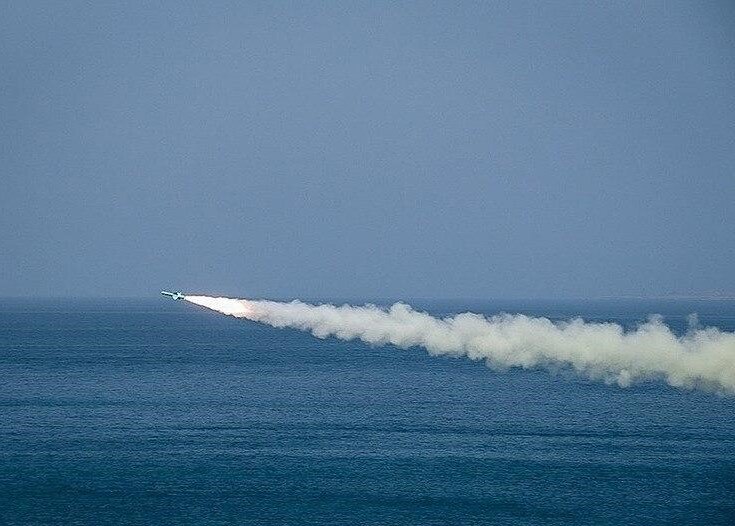Top IRGC commander: We can hit moving targets in the ocean from the heart of our land
Ballistic missiles successfully hit mock enemy’s vessels 1,800 kilometers away in Northern Indian Ocean

TEHRAN – The commander of the Islamic Revolution Guards Corps (IRGC), Major General Hossein Salami, said on Saturday that targeting aircraft carriers and warships by long-range ballistic missiles is part of Iran's defense strategy.
Speaking at the final stage of the Great Prophet 15 military drill on Saturday, Salami said, "One of our most important goals in defense policies and strategies is to reach the ability to hit enemy weaponry, including aircraft carriers and warships, using long-range ballistic missiles. It is usual to hit moving targets in the sea by low-speed cruise missiles, but using long-range missiles is a great defense breakthrough for us because we can hit moving targets in the ocean from the heart of our land," according to the Tasnim news agency.
The IRGC carried out the final stage of the drills on Saturday with strategic operations of long-range ballistic missiles that successfully hit the mock enemy’s vessels 1,800 kilometers away in the Northern Indian Ocean.
Armed Forces Chief of Staff Major General Mohammad Hossein Bagheri, Major General Salami, IRGC Aerospace Commander Brigadier General Amir Ali Hajizadeh, and a number of top brass were present during the last stage of the drill.
After detection of the hypothetical enemy ships’ position by the IRGC Aerospace reconnaissance systems, long-range ballistic missiles of various classes were fired from Iran’s central deserts and successfully hit and destroyed all targets in the Northern Indian Ocean some 1,800 kilometers away.
The IRGC started the first phase of the drills on Friday morning, during which the ground-to-ground ballistic missiles were fired and offensive drone bombers operations were put into action in the public area of Iran’s central desert.
During this stage of the wargames, after the attack of the IRGC Aerospace’s offensive bomber drones from all sides to the missile shield of the hypothetical enemy and complete destruction of targets, the new generation of IRGC ballistic missiles, those from the classes of Zolfaqar, Zelzal, and Dezful, were mass fired at targets, dealing fatal blows to the mock enemy bases.
The missiles were multiple re-entry vehicles (MRVs) with the capability of jamming and going through the enemy missile shield.
In relevant remarks on Friday, General Hajizadeh said his forces have created a new power in the Great Prophet drill through a combination of a variety of capabilities with artificial intelligence.
"Through the combination of new missile capabilities and drone operation with artificial intelligence, today a new power was born in the Guards. The first stage of the drill was a simulator for attacking the enemy’s power points and defensive lines," Hajizdeh said. "This stage was carried out using a combination of drones and missiles".
The commander also explained, "First, drone units targeted the defensive systems of the hypothetical enemy, and then, ballistic missiles destroyed the main assets and sections of the enemy base. Missiles used in this stage of the drill are a new generation of ballistic missiles equipped with detachable warheads and low RCS (radar cross-section). The time for preparation and operationalization of these missiles has been decreased by 90%. These missiles are operational and can be launched in less than five minutes after deployment."
Attacking the hypothetical enemy from all sides and altitudes, hampering the enemy’s defensive ability, infiltrating enemy’s missile shield by detachable warheads, and using equipment designed and produced by domestic experts are among features of the drill, the commander said.
Great Prophet drills are annual missile tests and exercises conducted by the IRGC. The first series of drills began in July 2008.
In recent years, Iran has made great achievements in its defense sector and attained self-sufficiency in producing essential military equipment and systems.
The Iranian Armed Forces test their preparedness and capabilities as well as their latest equipment and weaponries in different drills several times a year. For example, during the last few weeks, a wide range of newly-developed missiles and torpedoes as well as a large number of homemade weapons, tools, and equipment including UAVs and choppers have been tested by the Iranian Army and IRGC.
AJ/PA
Comments